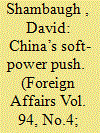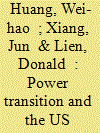| Srl | Item |
| 1 |
ID:
139347


|
|
|
|
|
| Summary/Abstract |
As China’s global power grows, Beijing is learning that its image matters. For all its economic and military might, the country suffers from a severe shortage of soft power. According to global public opinion surveys, it enjoys a decidedly mixed international image. While China’s economic prowess impresses much of the world, its repressive political system and mercantilist business practices tarnish its reputation. And so, in an attempt to improve perceptions, Beijing has mounted a major public relations offensive in recent years, investing billions of dollars around the world in a variety of efforts.
|
|
|
|
|
|
|
|
|
|
|
|
|
|
|
|
| 2 |
ID:
174854


|
|
|
|
|
| Summary/Abstract |
Many scholars have examined how the United States should respond to a rising non-democratic China. Contrary to the well-debated hard power domain, little attention has been devoted to China’s soft power. This study is arguably the first to systematically investigate the US response to the establishment of Confucius Institutes—China’s global initiative to expand soft power. We argue that the US decision to establish Confucius Institutes is influenced by both macro- and micro-level variables. At the macro-level, as suggested by the power transition theory, the United States is more likely to accommodate Confucius Institutes when China shows a higher level of satisfaction with the United States. At the micro-level, US universities and state governments host Confucius Institutes due to budget saving and community engaging. Our analysis sheds light on how the United States makes trade-offs when confronting China’s expanded soft power, and it provides yet another prominent example of money buying influence in international relations.
|
|
|
|
|
|
|
|
|
|
|
|
|
|
|
|